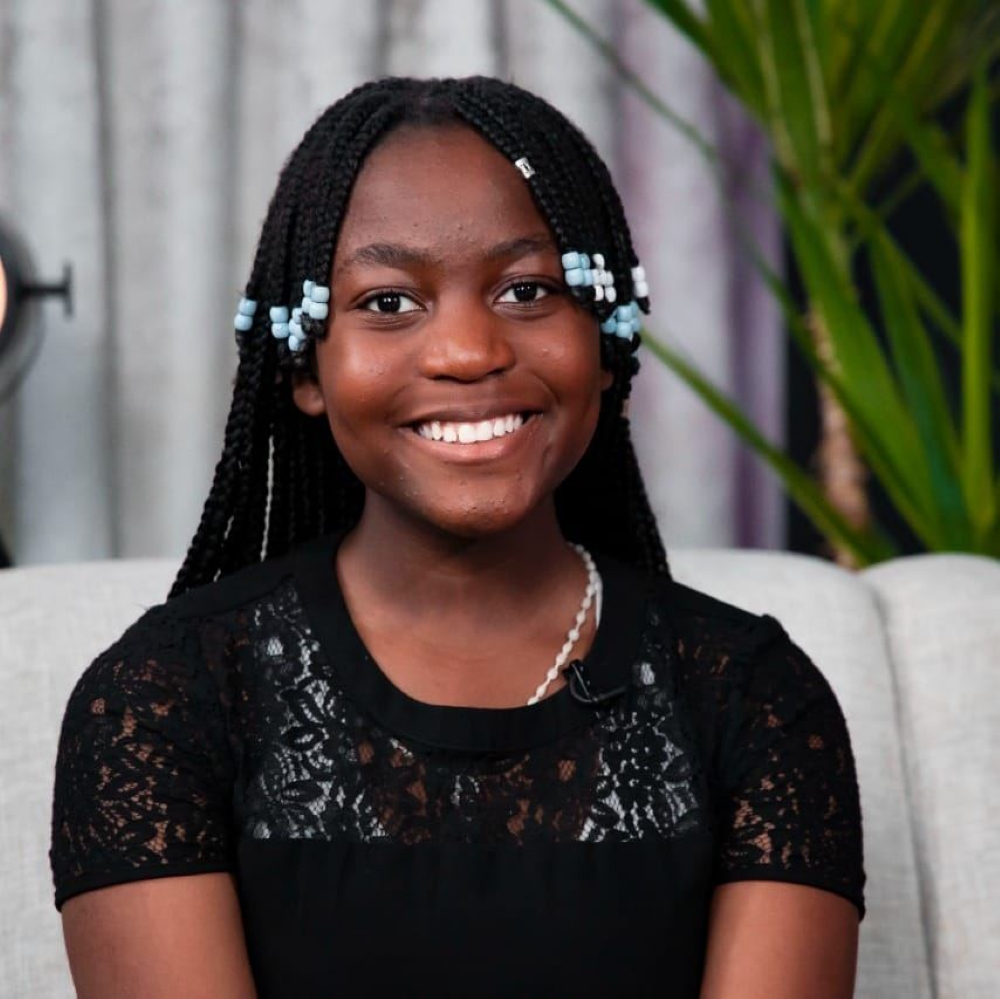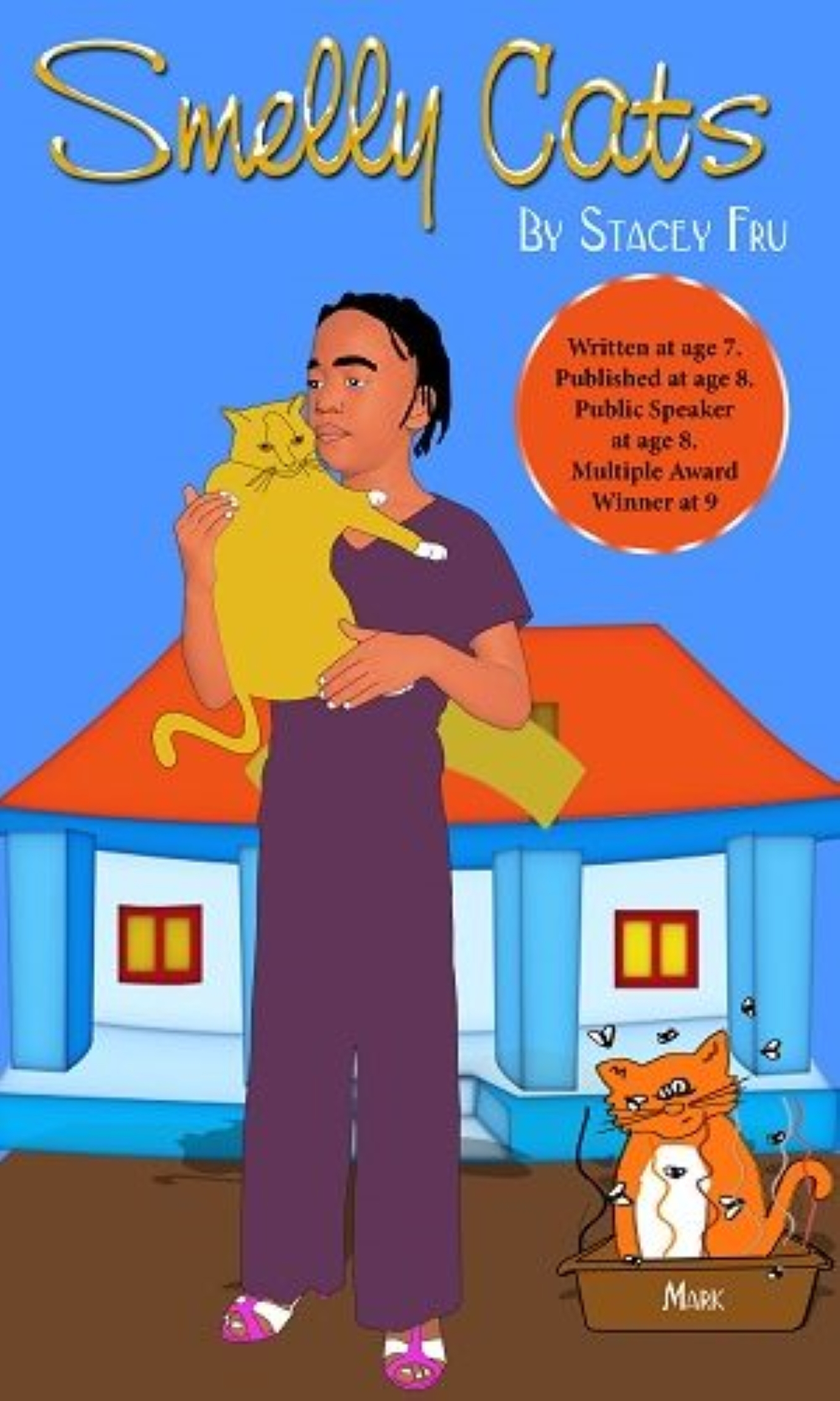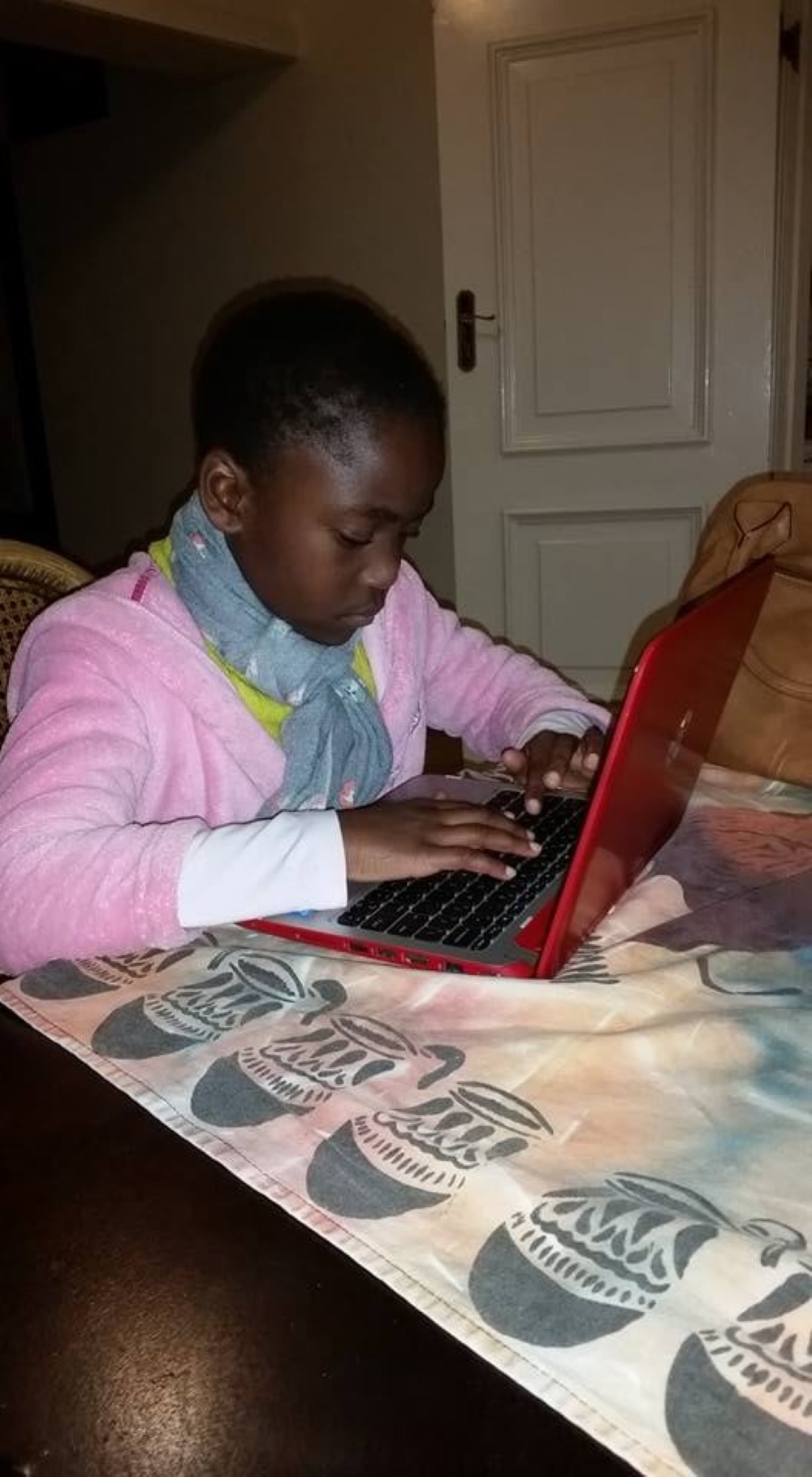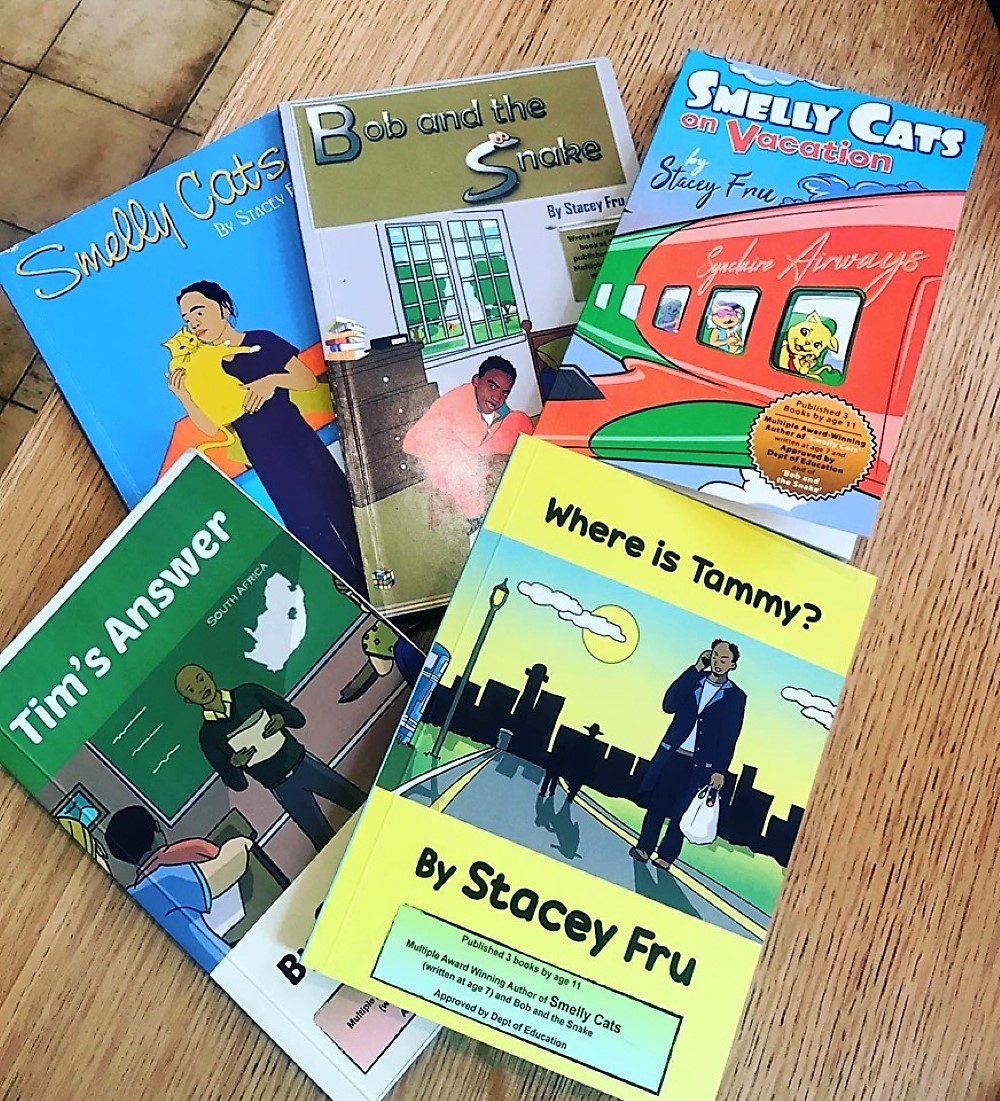Stacey Fru
(„Africa’s youngest published“) writer
South Africa
„Africa's youngest published author.“ Stacey Fru beared this title when she made headline first according to the news provider Independent Online. The seven-year-old wrote her debut without her parents‘ knowledge and published it just before her eigth birthday. Since the jump start this creative released more books and won multiple international awards including one being recognized as one of ten most influential women in the literary scene of South Africa. „In 2016, she founded the Stacey Fru Foundation“, knows Wikipedia. It is „a charity dedicated to improving access to education for children in South Africa's rural areas.“ No surprise that Advance Media included the name of the youngest Ambassador for Save the Children in a list of the 100 most influential young South Africans.
Stacey Fru
(„Africa’s youngest published“) writer
South Africa

Early practice only makes the master – the sooner the better. Stacey Fru (*16 February 2007 in Bramley, north of Johannesburg) must have internalized that saying. Her love for writing was inspired by children’s book that she started reading at an early age. “I thought the books I was reading were also made by the kids my age and I thought ‚okay, I want to be like them and I want to write my own book‘, so I did,” she told Reuters TV. Being just seven years old little Stacey wrote ‚Smelly Cats‘. In 2015 the story about two feline cousins and their „common challenges of different socio-economic, academic and religious backgrounds in which the two survive“ (nalibali.org), was published. Her debut „made Stacey Fru the youngest winner of the National Development Agency’s (NDA) Early Childhood Development Award, as ‘Best ECD Publication 2015: Special Mention Category’, a prize donated by the United Nations Children’s Fund (UNICEF)“, states culture-reviews.co.za. „Furthermore, Smelly Cats has been approved by South Africa’s Department of Basic Education as a recommended text for pupils, from the early childhood phase up to Primary School level. Stacey’s debut also led to her induction as the ‘Youngest founding member’ of the Wits University Centre for Multilingual Education and literacy, in 2016.“
However, it should not be forgotten that nothing can be created out of nothing and she’s privileged through giving. Stacey Fru, who is the second of four children, grew up in an appropriate environment: her Cameroonian parents are Dr. Emmanuel Fru, a political scientist, and Victorine Mbong Shu, the CEO of Profounder Intelligence Management Services, and herself an award winning author („Stop complaining! and Bring Back Involved Parenting“, „Not Too Late: Bring Back Involved Parenting“, „Trapped in our shadows“). “My mom did her master’s degree without telling anyone, and I also wanted to do the same when I wrote my first book,” Stacey Fru told Times Select with a confident smile, referring to her mother’s qualifications in communications studies.“
The wordsmith has caught fire quickly expressing herself as a storyteller, poet, teacher and motivational speaker (her first speech at age eight, was to over 877 Matric learners at the AngloGoldAshanti Career Expo 2015). While „Bob and the Snake“ as well as „Smelling Cats on Vacation“ were children’s books still, the follow-ups are dealing with serious issues. „Tim’s Answer“ is „how African children are taught to believe all good things come from the West“ (Wikipedia). „Where is Tammy?“, which is the first book in South Africa being published simultaneously in print in accessible formats for blind people, focuses on child abduction/kidnapping, child trafficking, safety and security.
“I’ll take about three to four months writing (a) book and then it would be another one to two months of the whole illustration, editing and publishing process and once that is finished then we’d have the amazing book launch”, Stacey Fru said to ewn.co.za. She has already set a personal target of having written twelve books, by the time she is in Grade 10! Her parents won’t have a voice about the chosen topics. “She’s very self-disciplined“, Stacey’s mother is quoted on Reuters TV. „When it comes to her writing, we really don’t have a say because we don’t interfere.”
The philanthropist wants to inspire, encourage and educate others as she is very disappointed that many children cannot read and write by age nine. Furthermore being unhappy that African children don’t celebrate African writers, she has commited to collect and distribute books by Africans and about Africa only, to children and institutions.
Stacey Fru lives close to Johannesburg (South Africa).
Interview January 2023
Inspiring by writing: model youth encourages others
INTUITION/IMAGINATION
How does intuition present itself to you – in form of a suspicious impression, a spontaneous visualisation or whatever - maybe in dreams?
Spontaneous visualization. I think it helps to be familiar with my characters and their surroundings so knowing and being able to visualize what is happening is helpful.
Will any ideas be written down immediately and archived?
Yes, typically I try to keep a track of my ideas (good or bad) and monitor how I feel about them. I learned in my early years that ideas, if not written down, are very easy to forget.
?: How do you come up with good or extraordinary ideas?
Weirdly enough I let my subconscious inspire me, through dreams etc. but also, a lot of rational thinking.
Do you feel that new creative ideas come as a whole or do you get like a little seed of inspiration that evolves into something else and has to be realized by endless trials and errors in form of constant developments up until the final result?
I get a little seed of inspiration which I have to nurture and grow because many ideas are not attractive enough so once something is, I have to develop the idea in my interest.
What if there is a deadline, but no intuition? Does the first fuel the latter maybe?
It depends on how important the deadline is but usually a deadline helps me stay motivated.
INSPIRATION
What inspires you and how do you stimulate this special form of imaginativeness?
My inspiration stems from the joy I have creating pieces and inspiring others with those works.
How do you filter between ideas worthwhile pursuing and bad ones that you just let go of?
I usually write within genres I am knowledgeable enough in so I stay clear of those that are tricky.
Has it to appeal to you primarily or is its commercial potential an essential factor?
Seeing as I have to spend so much time thinking, writing, editing and proofreading. I write about things that primarily appeal to me.
Do you revisit old ideas or check what colleagues/competitors are up to at times?
I try revisiting old ideas.
CREATIVITY
Which time/place/environment suits your creative work process the best (tranquillity or pressure) and which path do you take from theory/idea to creation?
In the late afternoons, anywhere quiet and cool is my go to space. I like having a little bit of pressure to keep my fingers typing. From a basic idea my favorite thing to do is establish my characters (names, ages, relationships, likes/dislikes), setting and from there I begin creating.
What is better in the realization process: speed and force creativity i.e. grasp the magic of the moment, or a slow, ripening process for implementation/elaboration?
Speed and force :-)
Do you have any specific strategies you use when you are feeling stuck creatively?
No, I just wait and if the wait is too long I sit/lay in silence till I think of something.
How important are self-doubt and criticism (by others) during such a process i.e. is it better to be creative on your own, only trust your own instincts, or in a team?
At the end of the day it’s your name being plastered with the book so while it is good to ask for advice when you need it, stick to what you feel is best.
Should a creative always remain true to him-/herself including taking risks & going against the flow or must one, for reasons of (commercial) survival, make concessions to the demands of the market, the wishes of clients and the audience’s expectations?
For survival, until you’ve built up quite a reputation, pleasing your readers (customers) is key.
How is innovation still possible if one has established a distinctive style and, just in case, is it good to be ahead of one’s time even one hazards not being understood?
I think if your distinctive style has readers, innovation is always possible. It is good to be ahead of your time if you want to end up like Van Gogh.
When does the time come to end the creative process, to be content and set the final result free - or is it work-in-progress with an endless possibility of improvement?
A little bit of both, every time I read one of my works, I always jump to edit and see fault but I remind myself that at a certain point in my life that was good enough. Also reminding myself to be respectful of the younger version and strive for improvement.
In case of failure or - worse - a creativity crisis how do you get out of such a hole?
Time. Time helps me realize an overreaction or allows me to discover new possibilities/routes.
SUCCESS
Should/can one resist the temptation to recycle a ‘formula’ one’s successful with?
Don’t resist the temptation, if you enjoy it - have fun recycling!
Is it desirable to create the ultimate/timeless work, but doesn’t “top of the ladder” bring up the question of “what’s next?” i.e. isn’t such a personal peak “the end”?
It is desirable to create something timeless but that does not mean the end of your journey.
MY FAVORITE WORK:
My first novel, that avidly shows my potential.


